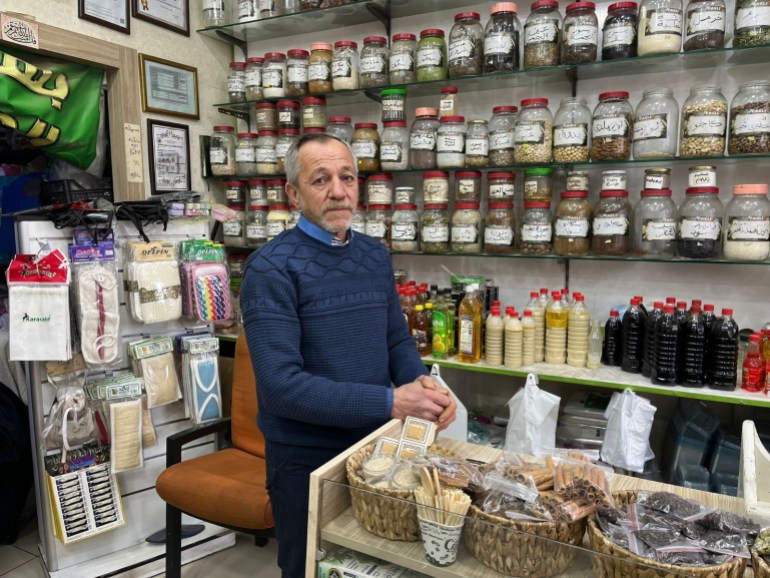Beirut, Lebanon – Youssef Salah and Mohammad Mahmoud shared happy cheek kisses while on their motorcycles at Cola Roundabout, a bustling transport interchange in Beirut.
“Today is the best morning,” the smiling Mahmoud, 20, exclaimed. “We feel the biggest joy,” he pointed to Ali al-Abed, 20, sitting behind him.
“We’re from Deir Az Zor,” al-Abed mentioned. “Free Deir Az Zor, remember that!”
A man from south Lebanon purchasing breakfast from a kaak vendor yelled out, “Who will rule you now? The Americans, the Israelis?”
“I don’t know, but it’s been 13 years,” Mahmoud shouted back. “Khalas [enough]!”
The three young men were radiant the morning after the collapse of the al-Assad dynasty’s reign in Syria, lasting 53 years.
A swift offensive by Syrian opposition groups liberated individuals from regime prisons and captured major cities – Aleppo, Hama, Homs, and finally Damascus – all in just over a week.
Hafez al-Assad took power in 1971, and his son Bashar succeeded him in 2000, following Hafez’s passing.
Syrians revolted against the regime in 2011 but faced severe repression that spiraled into a conflict involving regional and international actors.
By the end of November, over five million Syrians were refugees in the region, with millions more internally displaced.
Syrians forced to flee their homeland to escape violence shared their mixed emotions upon waking up on Sunday with Al Jazeera.
Echoes of cruelty
Most people in the region welcomed the end of the al-Assad dynasty.
“One heart isn’t enough to contain this immense joy,” Yehya Jumaa, a Homsi in Jordan, expressed. “We need 10 hearts to bear this joy.”
However, even with the regime falling, the shadows of its brutality linger through the harm it caused to many individuals.
Mohammad, 33, a Homsi in Chtoura, Lebanon, mentioned that three of his relatives were released from prison on Sunday, but others remained missing.
Nevertheless, Mohammad observed that the fear of speaking the truth had dissipated.
“Before, I wouldn’t have spoken if you had approached me. But now we are not afraid,” he stated outside a shopping center in Chtoura, about thirty minutes from Beirut.
“All the fear has vanished.”
Behind him, Syrians celebrated and chanted loudly: “God, Syria, freedom, and that’s all!”
Jumaa was also sorrowful about the condition of the released prisoners from regime jails.
“Many had no clue about what had been happening for years. Some believed it was [late Iraq strongman] Saddam Hussein who had set them free.”
Aleppan Abdelmonieim Shamieh, also in Jordan, shared his experience in al-Assad’s prisons when he was detained as a high school student in 1982.
“I was overwhelmed with joy and tears seeing the detainees… In the prison cells, I witnessed firsthand the torture prisoners endure, something no human can tolerate.”
“Many of my friends [who were arrested with him] perished under torture,” Shamieh recounted.
Going home?
In Cairo, Egypt, two young Syrians discussed the prospect of returning to their homeland, with only one of them old enough to recall the land he left.
![Amjad [Al Jazeera]](https://theusapage.com/wp-content/uploads/2024/12/1733745218_326_Syrian-refugees-celebrate-the-fall-of-Assad-but-proceed-with.jpg)
Amjad, 22, was elated as he completed his shift.
His Egyptian colleagues joined in his joy, embracing and congratulating him on the events in Syria.
“Now I can return and reside in my country,” he tearfully commented.
He fled Syria two years ago to avoid a harsh conscription service lasting up to eight years as al-Assad sought to bolster his forces.
Now, he can come back. “As soon as my UN card expires in two months, I will depart.”
A few blocks away, 16-year-old Suleyman Sukar managed the family-owned roastery where he worked.
The teenager, who had stayed awake throughout Saturday night awaiting news on the Damascus situation, appeared alert on Sunday, brimming with thoughts.
He was just four years old when his family had to flee Ghouta in 2012 due to intensified regime attacks, barely recalling his cherished Syria.
His bond with “home” was forged through his parents’ and siblings’ memories and conversations with family members back home.
Transitioning to Egypt was challenging for the Sukars as his parents had to work odd jobs for seven years before setting up the roastery.
![Suleyman {Al Jazeera]](https://theusapage.com/wp-content/uploads/2024/12/1733745218_29_Syrian-refugees-celebrate-the-fall-of-Assad-but-proceed-with.jpg)
Nevertheless, Suleyman shrugged it off. Once Syria stabilized, they would return home.
Suhaib al-Ahmad, a 58-year-old grocer in Ankara, Turkey, concurred, believing that Syrians abroad should aid in reconstructing their homeland.
“We should return with hopeful hearts and strive to restore Syria to its previous state, or even better,” he expressed.
“I pray this joy signifies a promising future for Syria and its people… I also hope Syria’s path ahead is bright, just as we always envisioned.”
Back in Tariq el-Jdideh, Beirut, Bishar Ahmad Nijris, exultant, conversed at his fruit stand.
“It’s a triumph for the entire world,” Nijris, 41, declared. “There’s no more oppression, and we can all live as one people, devoid of sectarianism… That’s our desire.”

Nijris, a veteran of al-Assad’s prisons after being detained without charges for two months in Mezzeh prison in 2013, hailed from the Israel-occupied Golan Heights, where his wife and children headed to on Saturday night – he plans to join them soon.
“I can go, and I will go, God willing.”
No more al-Assad bogeyman
In a cafe in Tariq el-Jdeideh, Ahmad, hailing from the Aleppo countryside, scrolled through his phone while enjoying espresso with his cousin Ibrahim, who frequently traveled to Syria.
As they conversed, another Aleppan arrived at the cafe with his three children, bearing trays of baklava, a Middle Eastern dessert, distributed to all customers in the cafe.
“Congratulations on your triumph,” the cafe owner commended the father of the children.
“Look at this,” Ahmad shared, scrolling through his friends’ Facebook stories, filled with posts showcasing the free Syria flag of green, white, and black.
“Do you know where Assad is?” he inquired, revealing a meme of the ousted Syrian president. “He’s stranded in the desert!”
![Yehya Jumaa [Habib Abu Mahfoudh/Al Jazeera]](https://theusapage.com/wp-content/uploads/2024/12/1733745218_789_Syrian-refugees-celebrate-the-fall-of-Assad-but-proceed-with.jpg)
Ahmad and Ibrahim chuckled at the digitally manipulated image of al-Assad sitting cross-legged outside a tent.
In the past, such humor was unthinkable, they mentioned. However, with the regime’s end, the fear and oppressive weight that many Syrians endured during the multi-decade rule of the al-Assad family eased.
“We are overjoyed, particularly for the generations to come,” Ali Jassem, 38, stated outside the building where he works as a concierge near Cola roundabout.
Due to Israel’s attacks in Lebanon escalating, his wife and children returned to Deir Az Zor three months ago and might remain now that the regime has collapsed, he disclosed.
Despite allowing a moment of relief, Jassem remained cautious, choosing to retain his job in Lebanon for now.
“Hopefully, the future days bring happiness to all,” he hoped.
Habib Abu Mahfouz contributed reporting from Amman, Jordan; Mat Nashed from Chtoura, Lebanon; and Zaid Isleem from Ankara, Turkey.




